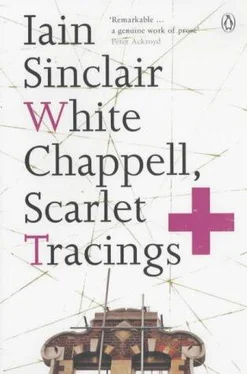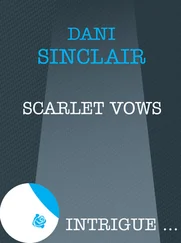He’s coming to Lane’s place that night and he wants his money. Before his coffee cup shatters on the table the entire caff, who have been forcibly listening to him roar, can turn and see him cycle past the window, up West, to watch a daylong Abel Gance film, on three screens. Energy is also a form of possession.
Nicholas bags the Eliot snap, no craziness to sell, no desperation to hold. ‘I’m sure of one thing. It’s the end now. The cycle’s over. Nothing more. The end of the world. That’s definite. You can actually see the millennial tremble, man.’
Thin, stained, fingers dipping and twitching over the sugar bowl; fingers like a fist of noses, shredded fine on the strings of an acoustic guitar, ichorate ghost of a rock musician. Remember that this man was on the bill with Bob Dylan at the Isle of Wight; was shortlisted to replace Brian Jones. It wasn’t his finger skills that blacked him, but the power of his nostrils. Their pepper ration was threatened.
He tilts the table with sudden fears. The colour runs out of his eyes. It’s true but you can’t see it. The end now. All over. Running into ourselves, running.
Old hippie, old monk. Nicholas Lane rises, to shake hands, an exquisite and natural courtesy; and leaves, through the crowd, faint shadow.
You can be so much in a room that the world outside turns to water. You’ve got the heater blowing out burnt air but you still don’t get warm. Your ankles are singed but your head’s in a bucket of ice. Time drips like a stalactite. The water for the coffee boils away in a tree of steam.
Young Kernan was a rock gofer, wounds running back to the prehistory of the early 70s, a maimed generation, like survivors of the first war, smiling, divine lit, never the same again, damaged, twitchy but blessed with the face of a recently roger’d altarboy. He’d followed Nicholas Lane through the great times into the bad, the worse, the bottom of the pit, looking somehow as if he was just back from a birching at the sauna. His clothes were in rags but he still had it, the newborn optimism of a true disciple who couldn’t believe it was all over. Someone should have slapped a preservation order on him. But in the new world of deals there is no contact sex.
He poured, from a blackened pan, hot water onto yesterday’s grains. Small domestic epiphanies light the squalor. Postcards, tribal carvings, dead-dada, some children’s toys. Old stories, not yet evaporated. Carpet worn to the boards. Set of scales. It’s weigh-out time. Not top shelf shit, but it should cut seven ways. Six to sell and one to keep. Pay out £650 to make £50. It takes a lot of work to keep work at arm’s length, to carry on working.
The Late Watson waited, what else. There was no point in trying for any other business. The mirror, the razor, the scales. Just pick up a book and read.
Somewhere, A Study in Scarlet : in his cabinet, that briefcase, or stashed? There’s a lot of night still unused.
In the street outside D/S Clark and Policewoman Dudley, on watch, revolve between the pub, which is the busiest brothel between Cable Street and Whitechapel, black guy running white women, disgusting, and the half-squat, a warren of garment outworkers, raincoat button-holers, kite dyers: all of them dealing. Where to start? Nothing worth kicking back.
‘See that Hessel Street. Worse than Calcutta. They’re butchering on the bloody pavements. Living in caves, the animals.’ And while he lays out his experience of local colour he makes a trial of his hand upon his subordinate’s black stocking’d thigh, fiercely muscled, meeting no resistance.
The staked heart of John Williams, the Ratcliff Highway Murderer, beats evenly at the quadrivium, at peace, from the shuntings of the work ethic, connected in a mysterious and unspoken thread to the recently scoured white stone blocks of St George in the East.
John Gull got his living from the water, shifting the fruits of the fields, by barge, from Hamford Water to the City of London, measures of wheat, measures of barley; and, in London, he got his death from water. It was always there and always with him. The comma-bacillus had not yet been named; unchristened, it was deadly.
The communal water-pump at Broad Street had been infected, sewage and water running together, harsh summer, the strings hanging from the boxes in Spitalfields Market were black with flies; Gull’s vegetables rotting in heaps; ants ran to the very steps of the church in such numbers that they could be taken up a handful at a time; the mad croaking of frogs.
The sun became black as sackcloth of hair, and the moon became as blood.
Gull’s blood boiled: and turned to water. His willed boundaries burst, he flooded into nothingness. Grit on the façade of lion-crusted buildings. Dust on the optimism.
Elizabeth, his wife, who had taken no firm stand on anything while John Gull lived, now that he was dead, insisted, was not to be shaken from the strangest, some said paganistic, cannibal island, demand. Grief had turned her, they said. But there was no outward show of grief. She was not what she had been. The bargemen, from respect, from a darker fear of John, that it should still be his voice speaking, obeyed her.
So it was that the longest, the blackest, the heaviest, the most imperial of John Gull’s barges came back to Landermere. The cholera victim, swaddled in white, bound close, unforgiving: his heat sealed. Came round the Naze and down Hamford Water, along Horsey, along Skipper’s Island; the birds of the estuary wheeling, a dull flat beaten-sun morning, early, the skin of water feverish, flinching from harm, breeze-shifting: a straggle of neighbours, obedient, subdued, Elizabeth and William, the boy, at the quay.
The bargemen, bareheaded, gave way; Elizabeth herself then leading the great horse, the Suffolk Punch, that dragged John Gull in his oversize floating coffin through close channels and cuts, among reeds; William following, a muzzled wolf.
They curved from sight of the line of solitary cottages. The bargemen, their wives, remaining, eyes on the imageless water, turned away: so many turnips on sticks.
In a place that was neither land nor water, in a field that had been cast adrift, unworked, the horse was freed from his harness. And the barge was fired.
John Gull’s back was to the sea when his bones broke from his flesh. His skull, lying in only inches of water, burst into flame, a lantern. He seemed to rise, to sit; bent, like a dry branch. His bird, a shard of black cloth, lifted, blazed, was gone.
The woman and the boy stood through the long afternoon. That place was theirs: unknown, it was shunned.
William Withey Gull, his red eyes brilliant in a blackened face, his cropped hair ashed into age, an old man, screamed out over the reeds in savage laughter.
The parson’s ambition would never now be satisfied in full: he could talk to William’s father, but would get no reply. He could talk as well to a fence-post or to one of the stones marking the channel across the mud to Horsey Island. He had talked to them; incontinent, solitary of speech, uncontradicted, he ranted at crows, he flattered the hedges, he debated with maggots in a rabbit’s skull, he checked improprieties among the flints. Men of the cloth live in this monologue, it is their due: nobody talks back to a pulpit.
John Gull’s defiant silence quickened, sharpened, enlarged his desire to open a conversation with his relict, Elizabeth.
The widow was a woman of moderate height, dark, full-figured. She smoothed her hair, but made no other gesture to vanity, before opening her door to the scratching of Mr Harrison, Rector of Beaumont.
Mr Harrison lived with the sand running through his fingers, the grains gushing from his spine, time was his fear: gone, gone, gone. Night sweats. The yawning grave. For ever. Clay on his eyes.
Читать дальше












